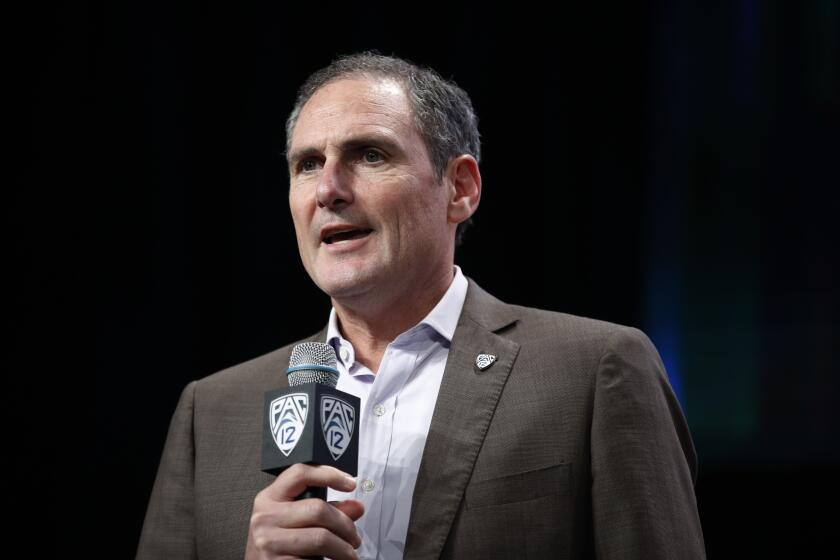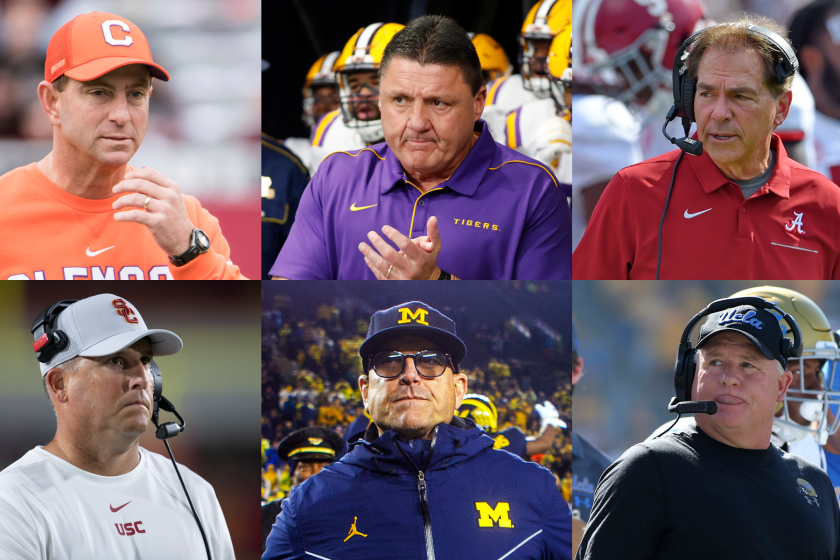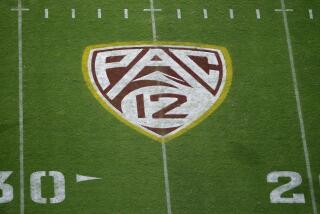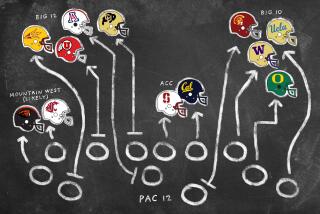Pac-12 plans to make decision on football season next week
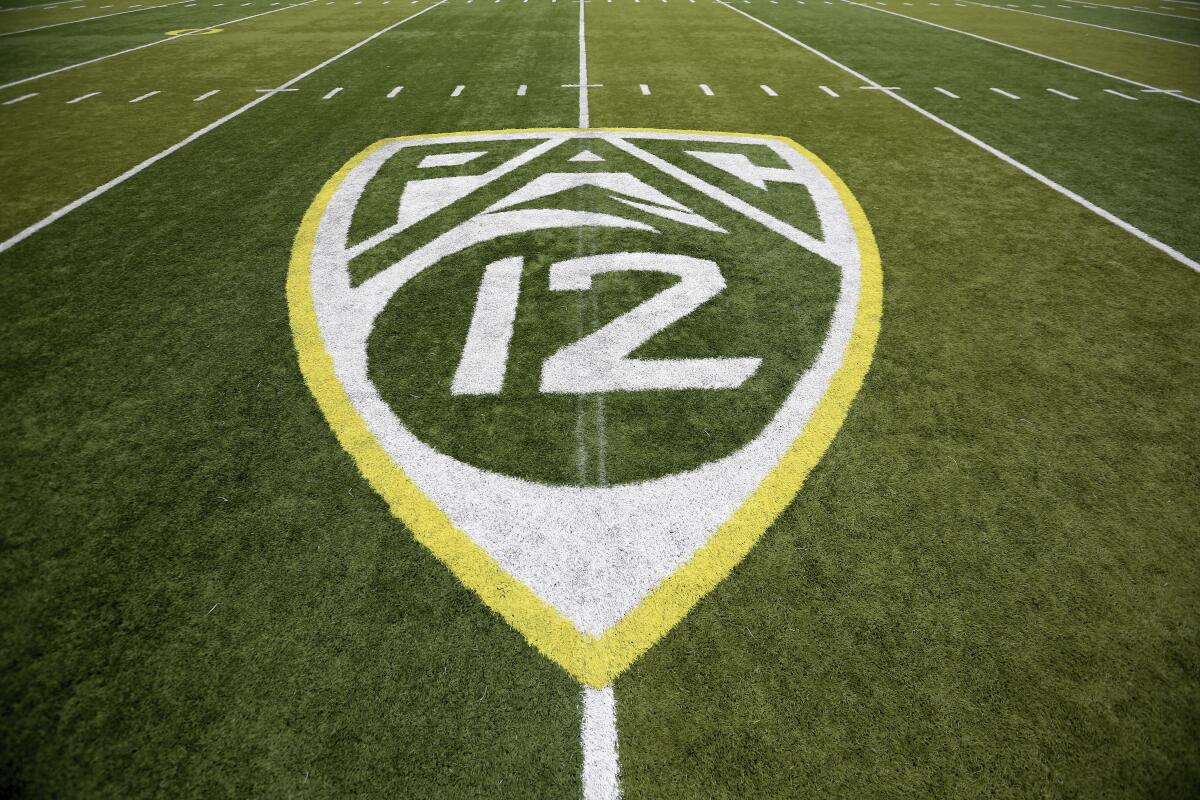
- Share via
At the end of a whirlwind week, one that turned the tide on the Pac-12’s daunting path back to fall football, university presidents and chancellors from the conference’s member schools met to deliberate over a season that now appears imminent.
No votes were cast, and no dates for a potential restart were set. But after an “informative and productive meeting” the conference announced that its only decision Friday was to push its vote on fall sports to the following Thursday.
Before the meeting began, Pac-12 Commissioner Larry Scott told “The Dan Patrick Show” that he wouldn’t push for a vote on Friday, but that the conference needed a decision by next week.
“We’ve overcome the major obstacles that we had and the criteria that our medical advisors set with the public health authority approvals,” Scott said. “But our presidents and chancellors have to weigh it on their campuses. They’ll be the ultimate decision-makers. … I’ll report to them that we’ve achieved those things and then it’s up to them to weigh it all and decide.”
The timeline on that looming decision sped up considerably over the past two days in the wake of the Big Ten’s announcement this week that it would return. In short order, governors in California and Oregon lifted restrictions in their states, while public health officials in Los Angeles County offered their approval for USC and UCLA to forge ahead later that night, in light of conference-wide plans to administer daily rapid antigen testing.
Rapid testing for COVID-19 is giving the Pac-12 hope of a speedy return to the college football season, but some questions remain.
The pressing question now isn’t so much whether the season will restart, but when. It’s widely believed among conference coaches and administrators that six weeks would be required to safely ramp up to a season. While some programs, like USC and UCLA, have been continuously training in small groups since June, others, like Washington and Oregon, have been dormant through most of September. That disparity makes starting by Oct. 31 — exactly six weeks from Saturday — an especially optimistic target date.
Rapid testing machines from Quidel Corp. won’t arrive on campuses until next week, Scott said, while Stanford and California are still beholden to more stringent safety restrictions in Santa Clara County.
A Nov. 7 start date would offer the Pac-12 six available Saturdays ahead of a conference title game on Dec. 19, the least among Power Five conferences hoping for a bid in the College Football Playoff, which is set to be decided on Dec. 20.
In a letter sent to Gov. Gavin Newsom earlier this week, USC players pleaded for “the same opportunity as other teams around the country to play for a national championship.” But with just six games expected on its schedule, the Pac-12 could face a serious uphill climb in convincing the committee it boasts a similarly deserving candidate for the playoff.
Unless postponements keep other Power Five contenders from playing more than six games.
“I don’t think if you ask any of my fellow commissioners, they can tell you how many games their teams are going to play,” Scott said. “They can try to play, but we’ve already seen in the first two weeks that every league that’s tried to play has postponed games. So no one is feeling supremely confident at this point.
“It’s uncharted territory. We don’t know how many games leagues are going to play. There are many more differences than we’re used to. I don’t know whether the average is going to be six games or eight games. I don’t think anyone can tell you. The committee is going to have their work cut out for them.”
Are universities getting good returns on their coaching investments? Here’s how much every NCAA college football coach is paid in the Power Five.
Baylor’s season opener against Houston, scheduled less than a week ago, was one of two Bowl Subdivision games postponed Friday — the day before before they were supposed to play.
Florida Atlantic’s opener against Georgia Southern was postponed earlier in the day, following the results of FAU’s COVID-19 testing Thursday. In both cases, the schools involved said they would try to find make-up dates.
The postponements illustrate the uncertainty surrounding college sports. The number of FBS games postponed or canceled because of COVID-19 issues since Aug. 26 is 16.
Minnesota star receiver Rashod Bateman has re-joined his team after opting out of the season, and hopes to be able to play when the Big Ten starts in late October. A similar return played out earlier this week at Ohio State.
In putting off its opener, Baylor said it was unable to meet COVID-19 roster thresholds set by the Big 12. The school did not provide specifics on the players or positions affected by the coronavirus or the number of players who were quarantined due to contact tracing; on Monday, it said it had six active cases across its athletic programs and that 23 total cases were being monitored.
Associated Press contributed to this report.
More to Read
Go beyond the scoreboard
Get the latest on L.A.'s teams in the daily Sports Report newsletter.
You may occasionally receive promotional content from the Los Angeles Times.

